Akshaya Tritiya is considered a day of luck. The Hindu community considers this day as a lucky day and believes that any venture such as a business or the construction of a building started on that day will follow betterment and prosperity.
Akshaya Tritiya is considered the golden day of the year because the word Akshaya means the most “Eternal” that which never diminishes. Any initiative made on that day or anything bought on that day is considered to be good fortune. In the Indian culture people typically starts a new business or begin a new venture on Akshaya Tritiya. This is also one of the most popular days for weddings to make plans as the spirit of this day bids them on a very long and fulfilling life journey. It was also believed that people born in that month will be very lucky and will shine brightly throughout their life.
Now when we are talking of Luck and lucky day, I guess we should also talk about the Lucky Gods, ????
Gods and Lucky, sounds strange, it is also it is not one God but its plural, and there are seven of them.
looks confusing.
But it’s not, the Japanese Shinto religion mentions seven lucky gods.
The Seven Lucky Gods of Japan are a group of deities who together bring loads of prosperity, health, long life and good luck to those who recognize them. Originally they were seen separately. During the 15th century, the seven gods started appearing as a group.
The 7 Lucky Gods
Budai
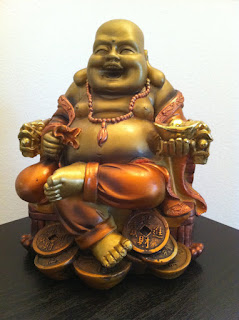
Budai is a Chinese folkloric deity. His name means “Cloth Sack,” and comes from the bag that he is conventionally depicted as carrying. He is usually identified with or seen as an incarnation of Maitreya, the future Buddha, so much so that the Budai image is one of the main forms in which Maitreya is depicted in China. He is almost always shown smiling or laughing, hence his nickname in Chinese, the Laughing Buddha. In the West, The image of Budai is often mistaken for Gautama Buddha and is hence called the Fat Buddha. Budai is traditionally depicted as a fat, bald man wearing a robe and carrying prayer beads. He carries his few possessions in a cloth sack, being poor but content. He is often depicted as entertaining or being followed by adoring children. He is a representation of contentment.
According to Chinese history, Budai was an eccentric Chan monk who lived in China during Later Liang (907–923). He was a native of Zhejiang and his Buddhist name was Qieci which literally means “Promise this”. He was considered a man of good and loving character. Budai in folklore is admired for his happiness, plenitude, and wisdom of contentment. One belief popular in folklore maintains that rubbing his belly brings wealth, good luck, and prosperity. The Zen belief for Budai is that He is said to travel giving candy to poor children, only asking a penny from monks or lay, practitioners, he meets. One day a monk walks up to him and asks, “What is the meaning of Chan?” Budai drops his bag. “How does one realize Chan?” Budai then takes up his bag and continues on his way.
Jurōjin

In Japan, Jurōjin is the God of longevity. Jurōjin originated from the Chinese Taoist god, the Old Man of the South Pole. He is known as the immortal of the Northern Song dynasty (960 – 1127), and may have been a historical figure of the period. Jurōjin is identified as the personification of the Southern Polar Star. While paintings and statues of Jurōjin are considered auspicious, he never developed a following independent of the other deities Seven Gods of Fortune.
Usually portrayed as bald with long whiskers, he is said to be an incarnation of the Southern Polestar. In many depictions, Fukurokuju has an abnormally high forehead. Jurōjin walks with a staff and a fan. He is depicted as an old man of slight stature, and by tradition, less than 3 shaku. He is depicted with a long white beard and often a very tall, bald head. He has a scroll tied to his staff, on which is written the lifespan of all living things ., The sacred book tied to his staff either contains the lifespan of every person on earth or a magical scripture. The scroll is sometimes identified as a Buddhist sutra. He is accompanied by a crane and a turtle, which are considered to be symbols of longevity. He is also sometimes accompanied by a black deer, ancient legends say a deer turns black if it is over 2000 years old.
Fukurokuju
In Japan, Fukurokuju means happiness, wealth, and longevity. It has been theorized that he is Japanese assimilation of the 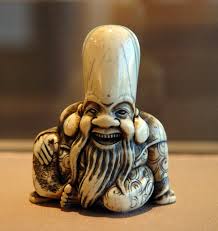 Chinese Three Star Gods (Fulushou) embodied in one deity. Most related in appearance to the Chinese star god Shou, he is the God of wisdom and longevity. According to some, before attaining divinity, he was a Chinese hermit of the Song Dynasty and a reincarnation of the Taoist god Xuanwu. It is said that during his human incarnation, he was a sennin; a philosopher who could exist without eating food. He is the only member of the Seven Lucky Gods credited with the ability to revive the dead.
Chinese Three Star Gods (Fulushou) embodied in one deity. Most related in appearance to the Chinese star god Shou, he is the God of wisdom and longevity. According to some, before attaining divinity, he was a Chinese hermit of the Song Dynasty and a reincarnation of the Taoist god Xuanwu. It is said that during his human incarnation, he was a sennin; a philosopher who could exist without eating food. He is the only member of the Seven Lucky Gods credited with the ability to revive the dead.
Bishamonten
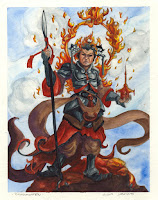
In Japan, Bishamonten is thought of as an armor-clad god of war or warriors and a punisher of evildoers. Bishamon is portrayed holding a spear in one hand and a small pagoda. On the other hand, the latter symbolizes the divine treasure house, whose contents he both guards and gives away. Bishamon is also called Tamonten “listening to many teachings” because he is seen as the guardian of the places where the Buddha preaches. He is believed to live halfway down Mount Sumeru. He is also associated with Hachiman.
Benzaiten
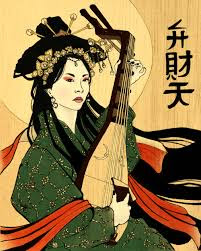
Benzaiten is a Japanese Buddhist goddess, who originated from the Hindu goddess Saraswati.
Worship of Benzaiten arrived in Japan during the 6th through 8th centuries, mainly via the Chinese translations of the Sutra of Golden Light, which has a section devoted to her. She is also mentioned in the Lotus Sutra and often depicted holding a Biwa, a traditional Japanese lute, just as Saraswati holds a Veena. Benzaiten is a Syncretic entity with both a Buddhist and a Shinto side.
Referred to as Sarasvati Devi in Sanskrit, Benzaiten is the goddess of everything that flows: water, time, words, speech, eloquence, music, and by extension, knowledge. The original characters used to write her name read “Biancaitian” in Chinese and “Bensaiten” in Japanese and reflect her role as the goddess of eloquence. Because of the Sutra of Golden Light
promised protection of the state, in Japan she became a protector-deity, at first of the state and then of the people.
Daikokuten
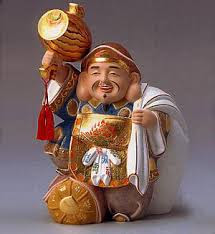 In Japan, Daikokuten, is the god of great darkness or blackness, or the god of five kinds of cereal. This god enjoys an exalted position as a household deity in Japan. Daikoku’s association with wealth and prosperity precipitated a custom known as fukunusubi, or “theft of fortune”. This custom started with the belief that whoever stole divine figures was assured of good fortune if not caught in the act. In the course of time, stealing divine images became so common a practice in Japan. The Toshi-no-Ichi “year-end market” held at Sensō-Ji became the main venue for the sale and disposal of such images by fortune-seekers. Many small stalls were opened where articles including images of Daikoku were sold on the eve of New Year celebrations.
In Japan, Daikokuten, is the god of great darkness or blackness, or the god of five kinds of cereal. This god enjoys an exalted position as a household deity in Japan. Daikoku’s association with wealth and prosperity precipitated a custom known as fukunusubi, or “theft of fortune”. This custom started with the belief that whoever stole divine figures was assured of good fortune if not caught in the act. In the course of time, stealing divine images became so common a practice in Japan. The Toshi-no-Ichi “year-end market” held at Sensō-Ji became the main venue for the sale and disposal of such images by fortune-seekers. Many small stalls were opened where articles including images of Daikoku were sold on the eve of New Year celebrations.Daikoku is variously considered to be the god of wealth, or of the household, particularly the kitchen. He is recognized by his wide face, smile, and flat black hat. He is often portrayed holding a golden mallet called a Uchide no kozuchi, otherwise known as a magic money mallet. Daikoku is seen seated on bales of rice, with mice nearby signifying plentiful food.
Ebisu
Ebisu or called Hiruko is the Japanese god of fishermen and luck. He is the only one of the seven to originate purely from Japan without any Hindu or Chinese influence.
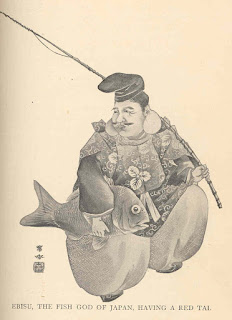
In medieval times, Ebisu’s origin came to be tied together with that of Hiruko – the first child of Izanagi and Izanami, born without bones (or, in some stories, without arms and legs) due to his mother’s transgression during the marriage ritual. Hiruko struggled to survive. As He could not stand, he was cast to the sea in a boat of reeds before his third birthday.
The weak child overcame many hardships, grew legs (and, presumably, the rest of his skeletal structure) at the age of three, and became the god Ebisu. He remains slightly crippled and deaf, but mirthful and auspicious nonetheless (hence the title, “The laughing god”). He is often depicted wearing a tall hat—the Kazaori Eboshi holding a rod and a large red sea bream or sea bass. Jellyfish are also associated with the god and the fugu restaurants of Japan will often incorporate Ebisu in their motif.
The story tells that Hiruko eventually washed ashore—possibly in Ezo ancient Hokkaidō and was cared for by the Ainu Ebisu Saburo. It is however believed that Ebisu first arose as a god among fishermen. His origin as Hiruko was a much later conception, after his worship of him had spread to merchants and others. It is also theorized that he was originally a god known as “Kotoronushi no Mikoto,” son of Ōkuninushi.


 Chinese Three Star Gods (Fulushou) embodied in one deity. Most related in appearance to the Chinese star god Shou, he is the God of wisdom and longevity. According to some, before attaining divinity, he was a Chinese hermit of the Song Dynasty and a reincarnation of the Taoist god Xuanwu. It is said that during his human incarnation, he was a sennin; a philosopher who could exist without eating food. He is the only member of the Seven Lucky Gods credited with the ability to revive the dead.
Chinese Three Star Gods (Fulushou) embodied in one deity. Most related in appearance to the Chinese star god Shou, he is the God of wisdom and longevity. According to some, before attaining divinity, he was a Chinese hermit of the Song Dynasty and a reincarnation of the Taoist god Xuanwu. It is said that during his human incarnation, he was a sennin; a philosopher who could exist without eating food. He is the only member of the Seven Lucky Gods credited with the ability to revive the dead. 

 In Japan, Daikokuten, is the god of great darkness or blackness, or the god of five kinds of cereal. This god enjoys an exalted position as a household deity in Japan. Daikoku’s association with wealth and prosperity precipitated a custom known as fukunusubi, or “theft of fortune”. This custom started with the belief that whoever stole divine figures was assured of good fortune if not caught in the act. In the course of time, stealing divine images became so common a practice in Japan. The Toshi-no-Ichi “year-end market” held at Sensō-Ji became the main venue for the sale and disposal of such images by fortune-seekers. Many small stalls were opened where articles including images of Daikoku were sold on the eve of New Year celebrations.
In Japan, Daikokuten, is the god of great darkness or blackness, or the god of five kinds of cereal. This god enjoys an exalted position as a household deity in Japan. Daikoku’s association with wealth and prosperity precipitated a custom known as fukunusubi, or “theft of fortune”. This custom started with the belief that whoever stole divine figures was assured of good fortune if not caught in the act. In the course of time, stealing divine images became so common a practice in Japan. The Toshi-no-Ichi “year-end market” held at Sensō-Ji became the main venue for the sale and disposal of such images by fortune-seekers. Many small stalls were opened where articles including images of Daikoku were sold on the eve of New Year celebrations.
